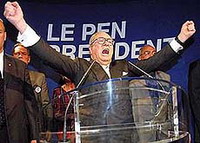French presidential race: outcome "not at all" predictable

Daniel Megnan is a French exclusive one. He decided to vote all top four presidential candidates. Just 10 days before the vote he still hasn’t made up his mind.
He likes conservative Nicolas Sarkozy's tough line on crime, but not his elitist attitude. He favors far right leaderJean-Marie Le Pen's career-long resistance to immigration, but says the 78-year-old is too old and extreme.
In the past, Megnan, a retired dairy farmer from western France, voted Socialist, but fears this year's candidate Segolene Royal "isn't up to snuff." His latest favorite is Francois Bayrou, who has risen in polls by navigating a middle course - but Megnan fears he may be too "wishy-washy."
Left, right or center? In this race it doesn't seem to matter. Voters sick of old ideologies are window-shopping for alternatives. Their indecision means front-runner Sarkozy is far from guaranteed the victory he's been counting on for years in the race to succeed Jacques Chirac.
The next president "will have a lot of things to do to fix the country," Megnan said on a verdant hillside in Laval while waiting to see Bayrou. "That's why it's such a difficult decision."
Restless French voters are seeking solutions for their listless economy and declining global role. But the blurred left-ride divide and the lack of strong new ideas in this campaign has left many at a loss.
The campaign is in a state of "constant channel-changing, with one idea that chases another" and not enough debate about each one, said Jean-Daniel Levy of the CSA polling institute.
The outcome is "not at all" predictable, he said.
Disillusionment with the traditional left and right has been spreading across Europe ever since the collapse of the Berlin Wall, and has been reflected in elections in the past two years in Germany, Italy, the Netherlands, Austria and the Czech Republic.
In France, Sarkozy and Royal have borrowed symbols and icons from the opposite camp in a race to offer voters something new.
Last year the two jockeyed neck and neck for months in opinion polls, far ahead of the rest of the pack. At the dawn of 2007, Sarkozy seized the lead and has held it ever since.
Then Bayrou bounded up to a solid third place, realigning the race. A poll by Ipsos Thursday showed Sarkozy with 29.5 percent, Royal with 24 percent and Bayrou with 19 percent. Another survey by CSA showed Sarkozy with 27 percent and Royal with 25 percent.
That means a tight race, considering the polls' error margins are 3 or 4 percentage points, and 42 percent of voters are still uncertain of their choice. Le Pen is polling fourth, but pollsters don't rule out a surge in support.
The two top vote-getters April 22 will face a runoff May 6. If it's a Sarkozy-Royal duel, polls put Sarkozy ahead. In a Sarkozy-Bayrou fight, most polls put Bayrou on top.
French voters like to buck expectations: In 2002 they unexpectedly handed second place to Le Pen, who has been convicted of racist and anti-Semitic statements and terrifies many French. He reached the runoff but was trounced by incumbent Chirac.
In 2005 voters turned against Chirac and rejected the European constitution, leaving the continent's future in limbo.
Both outcomes leaned heavily on last-minute decisions.
French voter uncertainty doesn't mean apathy: Voter registration is up by rates not seen in more than a generation, including in alienated suburbs that saw riots in 2005 by largely jobless, minority youth.
Rachid ben Moussa, 20, said his mother only recently registered to vote. She came to France as a toddler from Morocco 40 years ago and was encouraged to sign up by a neighborhood association in Angers.
"I think I'll vote, she wants me to," he said, craning his neck to glimpse Bayrou on an Angers plaza. "But I don't know which one would be best."
The watchword in this campaign has been change. Sarkozy, Royal and Bayrou are all in their fifties so, barring a massive Le Pen upset, one of them will become France's first leader born after World War II. Yet they have focused on mini-measures that capture viewers' attention rather than tough reforms that many say France needs to break out of the Chirac-era rut.
"It's difficult for (voters). It's a new cycle they are looking for, a new president in his behavior and his nature," said Bayrou as he made a campaign stop Wednesday in a small town called Change in western France. "It's a very important choice."
Subscribe to Pravda.Ru Telegram channel, Facebook, RSS!


